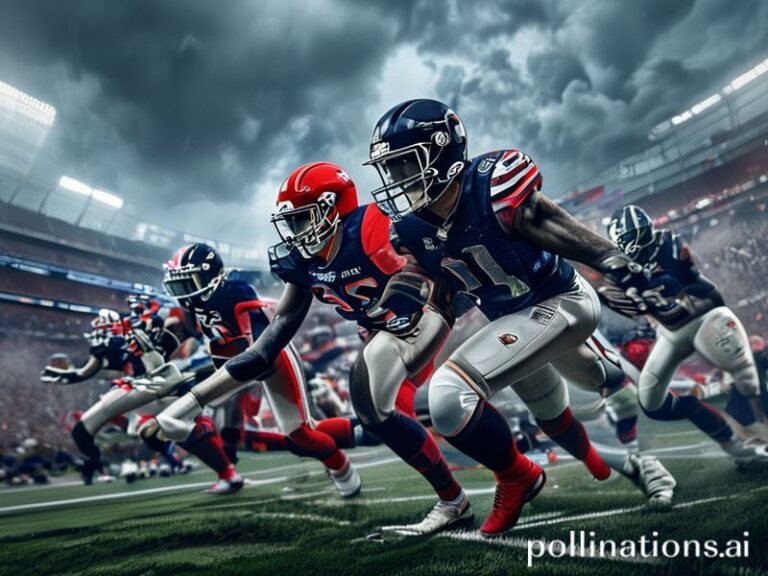Global Mulaney-mania: How One Catholic Altar-Boy-Turned-Comic Became the World’s Favorite Anxiety Translator
John Mulaney Lands in Paris, and the World Pretends It’s 1922 Again
By Dave’s Locker Diplomatic Desk
PARIS — On a rain-soaked Wednesday that felt suspiciously scripted, American comic John Mulaney stepped off the Eurostar, blinking like a mole in designer sunglasses. Within minutes, the Gare du Nord’s usual carnival of pickpockets and vape clouds parted as if Moses had upgraded to Rimowa luggage. International significance? Absolutely. Because when a midwestern Catholic boy who once compared Trump to a horse in a hospital crosses an ocean, the planet’s collective superego shudders like an overworked intern spotting another push notification.
Europe, currently auditioning for its own funeral dirge—energy prices doing interpretive dance, populists warming up behind the curtain—has decided Mulaney is the antidepressant it didn’t know it prescribed itself. Italian teens quote “Horse in a Hospital” while dodging tear gas in Rome; German cabbies hum his Salt & Pepper Diner bit between rants about diesel bans. The joke is no longer the joke; it’s the lingua franca of a civilization that outsourced its coping mechanisms to Netflix subtitles.
Across the Pacific, Japan’s Ministry of Economy quietly tallies the yen hemorrhaged on Mulaney tour tickets and shrugs: cheaper than another stimulus package. Meanwhile, Chinese streaming sites race to pixelate any reference to the Church (state algorithm: crucifix = potential subversion), inadvertently creating avant-garde comedy where Mulaney’s childhood altar boy trauma becomes a surrealist noodle commercial. The censorship is so clumsy that Weibo users now refer to confession as “emotional data laundering.” Everyone wins, except theology.
Back in the United States, the State Department has classified Mulaney’s global popularity as “Soft Power, Soft Waistline.” Analysts note his suits are cut slim enough to appease the French, yet roomy enough for the Midwestern dream of someday eating a second croissant. Somewhere in Foggy Bottom, a junior attaché drafts a memo titled “Leveraging Relatable Neurosis to Counter Belt & Road Initiative,” then deletes it because even bureaucracy has shame thresholds.
Of course, the world’s embrace is equal parts adoration and projection. Latin American fans hear Mulaney’s tales of suburban Catholic guilt and nod: same ecclesiastical trauma, different humidity. Australian audiences laugh at his drinking stories while sipping $18 flat whites that could degrease an engine, proving the universal truth that comedy travels best when wrapped in self-delusion. Africans on Twitter ask why the algorithm serves them a white guy in Paris when their own stand-ups can’t get visas; the algorithm, being a sociopath, changes the subject to cryptocurrency.
The economic ripple effects are already visible. Air France reports a 12% spike in Chicago–Paris bookings among Americans “seeking cultural redemption after the 2003 Freedom Fries incident.” Luxury hotels offer “MULANEY PACKAGE: croissant, existential dread, and a priest on speed dial.” Even the Louvre briefly considered replacing the Mona Lisa with a looping GIF of Mulaney imitating Mick Jagger, until someone reminded them the Mona Lisa already smirks like she’s heard the joke.
And yet, beneath the merch and memes, something earnest is happening. In Kyiv, a bomb-shelter comedy night opens with a Ukrainian comic translating “what’s new, pussycat?” to a room lit by generator power. Laughter, that most portable of currencies, exchanges at no worse rate than the hryvnia. In Tehran, VPNs smuggle Mulaney’s special past the firewall; viewers discover that Persian and English share a common phrase: “my mother is a tall, terrifying German woman.” Empathy by punchline—cheaper than sanctions, slightly more effective than TED Talks.
Conclusion: The planet is still on fire, but for ninety minutes in whichever time zone you’re doom-scrolling, a lapsed altar boy from Chicago reminds us that panic attacks are universal, pants can always be tighter, and the apocalypse will probably have a two-drink minimum. Mulaney hasn’t saved the world; he’s just given it a synchronized laugh track while we wait for the next catastrophe. Which, knowing our luck, will be sponsored and have stadium seating. Curtain.







